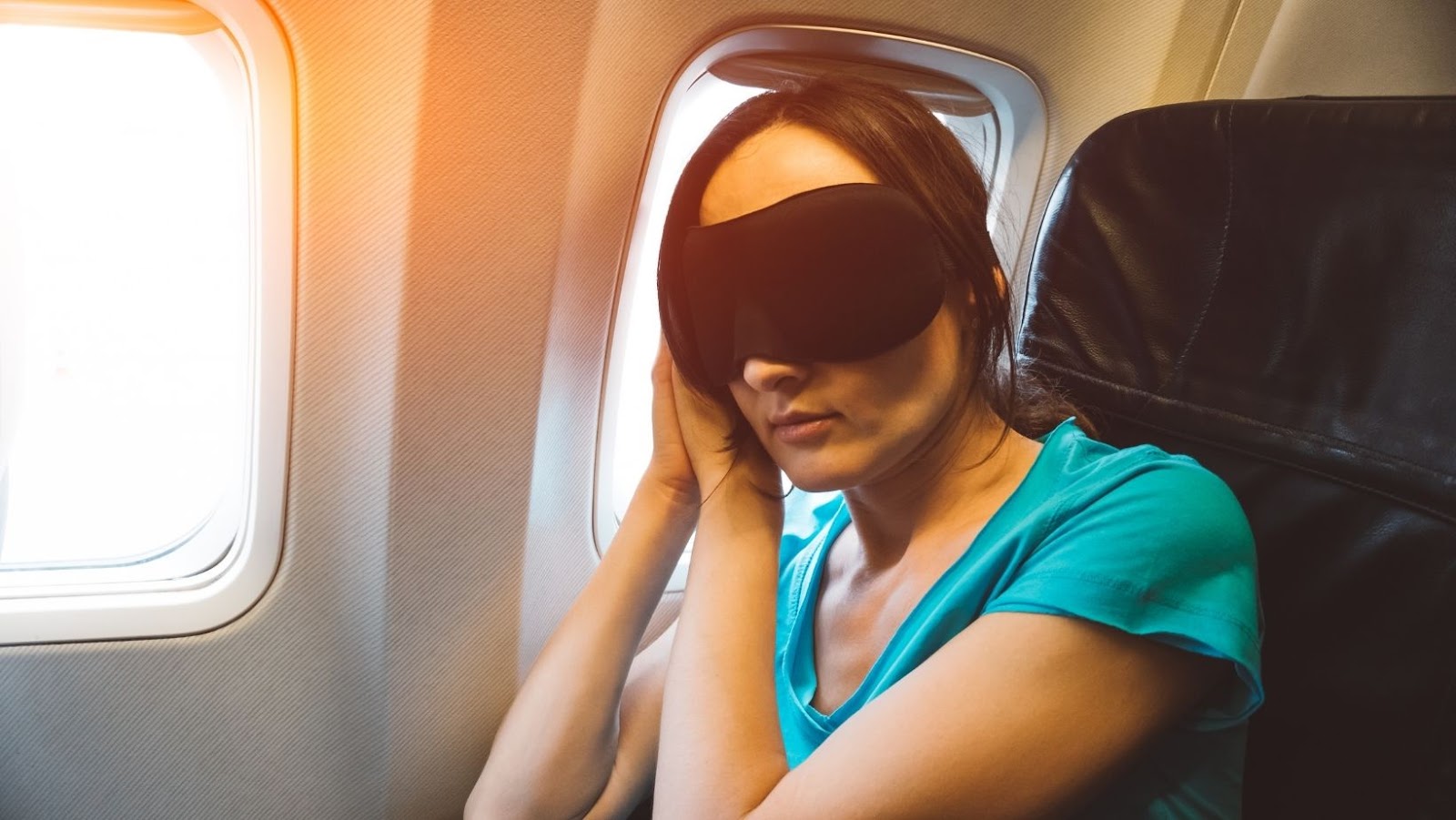11 Tips for Dealing with Jet Lag

Hi, I am Betty Knight, Owner of this site! I…
Landing and getting off the plane can be exhilarating. After all, you’ve had all the time in the world on the plane to think about all of the fun and exciting things you’ll be doing. Unfortunately, you feel sluggish as you race your way to your luggage. You walk by local vendors in excitement only to be hit by an energy wall.
You start to have trouble concentrating, and you even look disoriented. This is known as jet lag. A lot of people get it when they travel. This is especially true if you are changing time zones. While it’s temporary, it can disrupt your entire trip. Here is what you need to know about jet lag and how to combat it.
What’s Going On With Your Body When You Suffer From Jet Lag?
Your body has an internal clock. This internal clock is what’s known as your circadian rhythm. Within every 24 hours, your body’s internal systems do things to regulate this internal clock. Things like your body temperature dropping at night to your blood pressure and glucose going up and down. All of these things are run by the internal clock in your body. This clock will run either fast or slow based on your exposure to light and dark. It also matters when you are exposed to each. This is why it’s so important to sleep in complete darkness.
Usually, you get the same amount of sunlight every day. While it can vary from season to season, it’s generally going to be around the same amount. The changes that occur within seasons happen gradually to give your body plenty of time to adjust properly. This isn’t true when you go somewhere far away. If you travel by plane to a different country in a different time zone, your body will still be wired to your home time zone. This can cause a major disruption to your internal clock. After all, you could be in a place that is daytime when you are used to it being nighttime. This dramatic shift can completely throw your internal clock out of balance.
For instance, if you find yourself traveling east, you’re likely going to find it increasingly difficult to get to sleep at night. It’s also like to take your body a lot longer to adjust when you are traveling east because of this. As a general rule of thumb, you can expect to remain in a jet-lagged state the total number of days equal to the time zones you cross. Thus, if you head three time zones eastwards, you are likely going to expect to feel jet-lagged for a total of three days.

Whereas, if you are traveling west, you are likely going to wake up sooner than you might like. However, it’s not going to take you nearly as long to adjust because the adjustment is easier to make. You will tend to find yourself maintaining a jet-lagged state for around two-thirds of the time zones you cross. Therefore, if you travel three time zones to the west, you can expect to be jet-lagged for around two days total.
Can You Do Anything To Stop It?
Unfortunately, jet lag isn’t preventable. However, there are plenty of things you can do to reduce its impact on you. Here are some of the best tips to avoid heavy jet lag while traveling.
1. Adjust Light Exposure Before
One of the best things you can do is start to get your body used to the new time zone you will be traveling to. You can start to control your light exposure before traveling to trick your body into adjusting before you even get to your destination. A couple of nights beforehand, you can start to figure out when you will go to sleep and wake up. If possible, you can start this schedule early. This can make it easy for you to seamlessly transition into the new time zone without a sudden adjustment needed. This is going to make your jet lag hardly noticeable because your body will have more time to adjust to the changes gradually.
2. Take Supplements
Various supplements can make it easier for you to fall asleep. One of the main reasons you could find it difficult to avoid feeling jet-lagged has to do with your inability to fall asleep when you need to the first night. This is especially true if you are traveling east. When you take a supplement like melatonin sleep gummies, it can make it easier for you to fall asleep to get ample rest the first night, according to Unwind. This is known as the sleep hormone that your brain produces to help you fall asleep.
It’s only released when you are exposed to complete darkness, and it can get disrupted with exposure to even the smallest amount of light. You can take smaller doses of melatonin to combat symptoms of jet lag. You also want to ensure you are taking it at the right time. Ideally, you want to take it 12 hours before you want to wake up. Resist the urge to take more than 0.5mg because you won’t get any more benefits from taking higher doses. You could increase the symptoms of jet lag if you do. You’ll want to take these supplements before your trip making it easier to gradually get yourself falling asleep and waking up at the right time days before.
3. Time Your Flight
You want to try to find the right time to take your flight for the least disruption to your normal schedule. This isn’t always possible. However, if it is, you’ll want to time things, so you wake up when your plan arrives at your destination. For some, this may require the use of sleep aid or even melatonin. If you simply cannot fall asleep when you are on the plane, try to keep yourself active during the flight.
4. Avoid Layovers
Layovers are one of the easiest ways to throw off your internal clock and get yourself even further jet-lagged. Layovers are very disruptive and can dramatically throw off your internal clock because you don’t have nearly enough time to get used to the local time zone. Therefore, you should try to avoid layovers if at all possible to avoid jet lag.
5. Avoid Relying On Stimulants
You don’t want to drink too much coffee before, during, or after your flight. Not only is this going to disrupt your natural sleep/wake cycle, but it’s going to dehydrate you too. Being dehydrated is one of the easiest ways to worsen the effects of jet lag. Because of this, you’ll want to steer clear of alcohol too.
6. Force Yourself Through It
If you land and you are feeling jet-lagged, avoid the urge to stay inside and go to sleep. Instead, you’ll want to go outside and get active. Try to expose yourself to as much sunlight as possible. This is a good way to get your body to adjust quickly. While you may not be ready to eat when you arrive, try to get something in your stomach. The sooner, the better because it can help you sync up your internal clock.

7. Limit Your Naps
Ideally, you want to avoid the temptation to nap. While you can take a short nap when you arrive, you’ll want to try to keep it under 30 minutes. Anything over 30 minutes and it’ll likely disrupt your sleep at night. This is only going to worsen your symptoms of jet lag and keep you feeling jet lagged for longer. Avoid sleeping early and try to stay awake until your normal bedtime, and get up at the right time to start your day.
8. Bring Accessories
As mentioned, getting sleep at the right time is key. The best way to do this is by prepping yourself for optimal sleep. You need to bring a sleep mask to block out excess light. You also want to try to bring earplugs to either get sleep on the plane or to block out excess noise when you arrive at your destination.
9. White Noise
If you are in an unfamiliar place that has a lot of noise, it’s going to disrupt your sleep. You can drown out the noise by using a white noise app on your smartphone.
10. Weather
A lot of people do not fall asleep very easily when they are hot. Your body naturally cools itself down to prep you for sleep. Because of this, you want to try to keep yourself cool when lying down. You can bring a small fan with you in case you arrive at a place that’s too hot. You can also bring extra clothes or a blanket if the place is too cold.
11. Altitude
If you are traveling somewhere elevated, it’s going to take your body some time to get used to the higher than normal altitudes. Therefore, you want to be aware of this when you step off the plane. You need to keep yourself hydrated as much as possible as it can be easy to get dehydrated at high altitudes. You’ll also want to pay attention to your breathing and try to use a humidifier at night if you have one.
What's Your Reaction?
Hi, I am Betty Knight, Owner of this site! I am a 'nearing 30-year-old', happily married to 1 awesome man. We live in the beautiful tourist town of Franklin NY.



